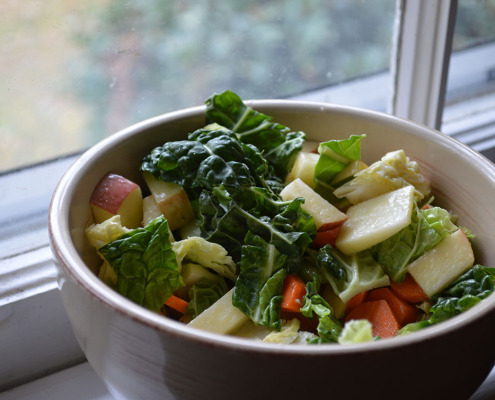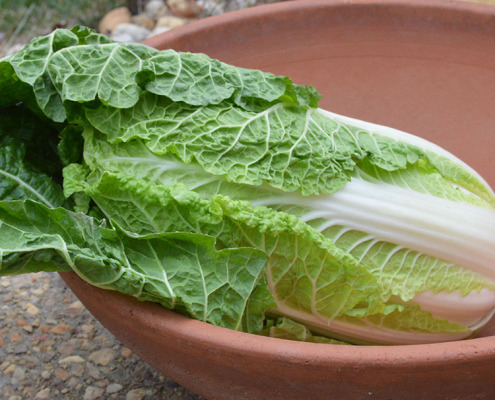‘Tis the season for greens!
– Written by Margo L, veggie fairy & neighborhood Market Manager in Yorktown
Greens are loaded with perishable nutrients, so long as they’re fresh like our locally harvested greens. Our farmers are harvesting two types right now. The cabbage family (Cruciferae) includes bok choy, broccoli, cabbage (obviously), collards, kale, and turnips (which have tasty greens). The goosefoot family (Chenopodiaceae) includes beets, chard, and spinach.
So here’s the inside scoop on the difference between greens and how to make use of them, including how to cook greens.
Beets
Beets are loved or hated. They’re dense and have a strong, earthy flavor. But they’re also full of sugars. Beets can be boiled, steamed, or roasted to be eaten on their own or added to salads. They can even be used as a sweetener when baking certain desserts. Beet greens make an excellent salad green or can be sautéed or steamed.
Bok choy
Bok choy is sweet, crisp, and mild tasting. The stems are juicy and sweet and take a few minutes longer to cook than the mild-tasting greens. It’s delicious in stir fries and soups.
Broccoli
Broccoli crowns can be eaten raw, or cooked along with the stem. Just discard the shard tip, then slice the rest of the stem and steam or roast the slices longer than the crown, which needs only brief cooking. Bake broccoli into casseroles or add to soups and stews.
Cabbage
Cabbage, when overcooked, emits hydrogen sulfide (the rotten egg aroma), ammonia, and other foul smells. But cooked with care, it’s delish. Add it to soups or baked dishes, or simmer, sautée, or steam it. Eat it raw in slaws and salads, or use the leaves to wrap up a savory filling. Savoy cabbage, by the way, is the one with extremely crinkled leaves.
Chard
Chard, including lovely rainbow chard, is almost as quick cooking as spinach. You can steam, sautée, or braise it, or add it to soups, stews, and casseroles. The leaf and stem can be prepared together or they may be cooked and served separately.
Collards
Collards are actually a mild tasting variety of kale. Leathery looking but tender after an encounter with heat, they both do well when you slice them into slivers and cook them briefly. They’re commonly cooked with smoked meats, onions, chiles, garlic, and vinegar. But they’re also good with ginger, coconut, and spices like turmeric, coriander, cardamom, and cumin. Raw kale is good in salads or hide it in a smoothie.
Spinach
Spinach is a delicate veggie and best when lightly cooked, just until it begins to go limp. Its mild flavor absorbs any seasoning and its leaves have a velvety quality. Just wash it well, shake off most of the water, and put it in a hot pan – the moisture clinging to the leaves will be sufficient to wilt it. Spinach can also be eaten raw in a salad or smoothie.
Turnips
Turnips, in this case salad turnips, taste similar to a radish – earthy, crunchy, and peppery. Eat the roots and greens raw in a salad, or slice and sautée them.
So eat your greens, enjoy the flavors, and feel oh so very virtuous!
ABOUT SEASONAL ROOTS
Since 2011, Seasonal Roots’ online farmers market has connected Virginia families with local family farmers who use sustainable, humane practices. Our veggie fairies – mostly moms who believe in living better through scrumptious, healthy eating, being kind to animals, protecting the environment, and spreading joy – home-deliver freshly harvested produce, pastured eggs, grassfed dairy and meat, plus artisan fare. We empower our members to eat better and live better with more nutritious, flavorful food that’s good for us and good for the planet. More info at seasonalroots.com.








